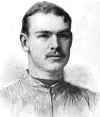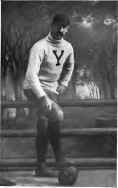The Centre Or Snap-Back
Description
This section is from the book "American Football", by Walter Camp. Also available from Amazon: American Football.
The Centre Or Snap-Back
The man who may be selected to fill the important position of centre-rush must be a man of sense and strength. Brain and brawn are here at their highest premium. But there is another element of character without which both will be overthrown, and that is patience. Practical experience has taught football coaches that none but a thoroughly self-controlled man can make a success in football in any position, while in this particular one his disposition should be of the most-equable nature. He will be called upon to face all kinds of petty annoyances, for his opponents will endeavor to make his play as difficult as possible; and never must he allow himself for one instant to lose sight of the fact that his entire attention must be devoted to his play, and none of it distracted by personal feeling. Moreover, while he must be able to play the ball quickly when called upon, he can never afford to be hurried by his opponents. With the present excellent rulings of umpires regarding interference with the ball before it is snapped, much of the most harassing kicking of the ball from under his hand has been stopped; but, for all that, he is indeed a lucky centre who does not feel the ball knocked out from under his grasp several times during a game.
In addition to this, every man who breaks through gives him a rub. Sometimes these knocks are intentional, often they are given purely by accident, and the latter are by no means the lightest. Then, too, a man is pushed into the snap-back just as the ball goes. It may be his own guard, but the blow hurts just as much; and a centre who is not amiable under such treatment soon loses his head and forgets that he should care for nothing except to accomplish gains for his own side. The object of placing so much stress upon this qualification is to impress upon a coach the almost inestimable value of the quality of patience in any men he may be trying for this position. He can never say too much about it.
As regards the duties of the place, they differ from those of any other position in the line on account of the constant presence at that spot of the ball. The centre is either playing the ball himself or watching his antagonist play the ball at every down; so that while he has all the other duties of a forward to execute, he has the special work besides.
Here is the weakness of so many centres. They are snap-backs only or forwards only, the former being by all odds the more common. A good critical coach of experience will see nine out of every ten men whom he may watch in this position playing through day after day with no more idea of doing any forward work than if they were referees. Putting the ball in play at the right time, and properly, is a great achievement, but it does not free the centre-rush from all other obligations. He must protect his quarter; he must aid in making openings, and perform any interference that may be possible, as well as always assisting a runner of his own side with weight or protection. He must always get down the field under a kick, for it is by no means unusual for him to have the best opportunity in these days when end rushers are so carefully watched. When the opponents have the ball, he must not be content with seeing that the opponent does not roll it to a guard, but must also see that there is no short, tricky passing in the scrimmage. Then he must be as ready as either guard to meet, stop, or turn a wedge.
He must make openings for his comrades to get through, even when he himself may be blocked, and always be ready to reach out or throw himself before a coming runner to check the advance.

JESSE RIGGs. Princeton.
The details of the special work of the centre are many, and thorough knowledge of them can only come from experience. During his early progress a new snap-back usually sends the ball against his own legs, or, if he manages to keep them out of the way, is upset by his opponent for his pains. It is no child's play to hold a ball out at arm'slength on the ground in front of one and roll it back so that it passes between one's feet, and still preserve a good balance in spite of a sudden push of a hundred-and-eighty-pound opponent. But that is just what a centre has to do every time the ball is down and belongs to his side. The first thing to teach a centre is to stand on his feet against any amount of jostling. Then he must learn to keep possession of the ball until ready to play it. Both of these acquirements take practice. The most finished and experienced centres have a way of playing the ball just as they are half straightening as though to meet a charge from in front. This insures their not being pushed over on to the quarter, and yet does not cause them to lean so far forward as to be pitched on their noses by a little assistance from the opposing centre.
When a man stands so as to prevent a push in the chest from upsetting him, he naturally puts one foot back some distance as a support. When a centre does this he is apt to put that foot and leg in the path of the ball. A second objection to this way of standing is, that the centre does not offer nearly as much opposition to any one attempting to pass as he does when he stands more squarely faced about with a good spread of the legs. As to holding the ball, some centres prefer to take it by the end, while others roll it on its side. It can be made to rise for the quarter if sent on end, whereas if played upon its side it lies closer to the ground. The quarter's preference has, therefore, something to do with it. It requires longer practice and more skill to play the ball on its end, but it permits an umpire to see more clearly whether the ball be actually put in play by the snap-back or played for him by the surreptitious kick of the opponent. It has also the advantage of sending the ball more narrowly upon a line, so that its course is less likely to be altered than when rolled upon its side.
While the snap-back is seldom held to the very strictest conformity to the rule about being on side when he puts the ball in play, it is necessary for him to practise with a view to this particular, because he is liable to be obliged to conform every time if the opponents insist. The reason for carelessness in this respect is, there is no penalty for infringement except being obliged to return to the spot and put the ball in play properly. A certain laxity, therefore, is granted rather than to cause delays. But, as stated above, a centre must be able to put the ball in play when fairly on side, and must live up to this with some moderate degree of regularity, or else the umpire will call an off side and bring him back. A centre ought to practise putting the ball in play with either hand until he is fairly proficient with his left as well as his right. Not that he should use his hands alternately in a game, but that an injury to his right hand need not necessarily throw him out of the game. It is by no means an unrecognized fact that the greater amount of experience possessed by the regular centre is so valuable as to make it policy to keep him in his place so long as his legs are good, even though a hand be injured, rather than to replace him by the substitute with whose methods the quarterback is not so familiar.

W. H. CORBIN. Yak.
A coach should see to it that his centre has a variety of men to face, some big, some tricky, some ugly. If any old players come back to help the team in the way of coaching, and among them are some centre rushers, they can do no better work than by donning a uniform and playing against the "Varsity" centre.
Continue to:


